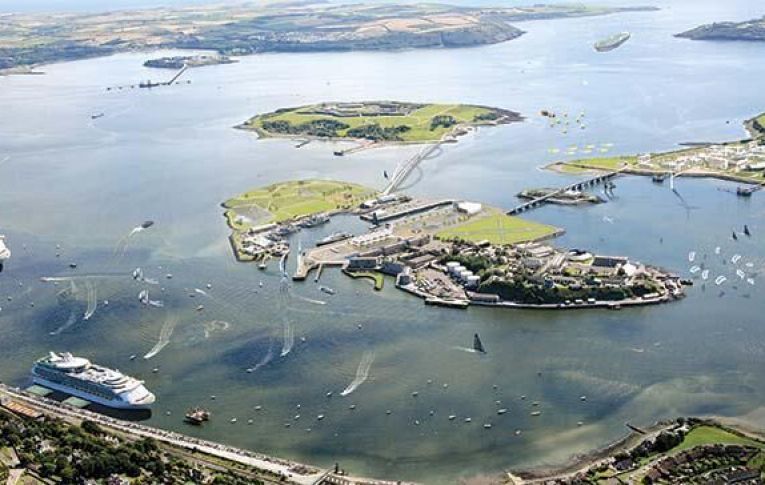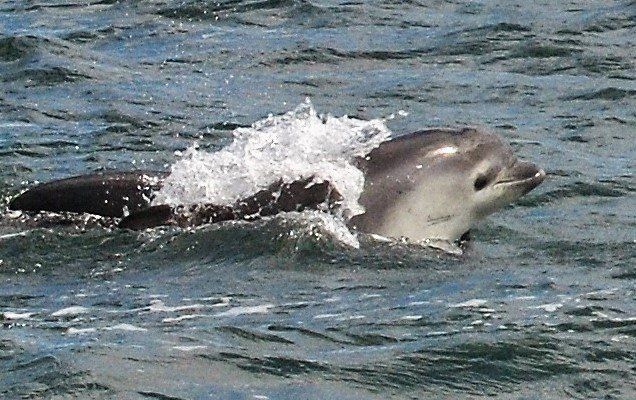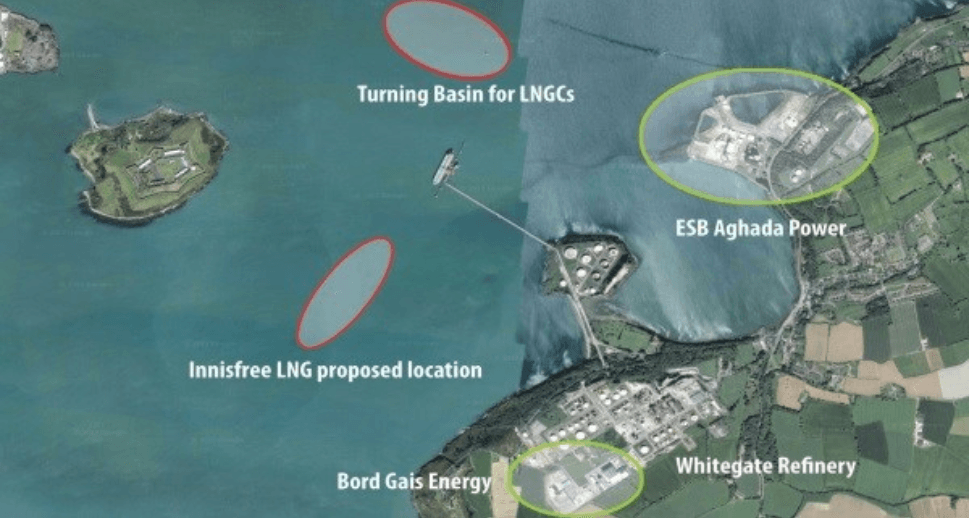Fracked Gas to be imported into Cork Harbour's Proposed LNG Terminal.
The Port of Cork is under scrutiny having signed a deal in 2017 with Texan company who is seeking permission to build a Liquid Natural Gas (LNG)Terminal in the Cork Harbour which will import fracked gas. This comes amid controversy over the proposed Shannon LNG Terminal, which has been condemned by celebrities such as Mark Ruffalo, Cher and Michael Moore and as O.R.C. researchers begin to gain a better understanding of the importance of Cork Harbour for protected species such as bottlenose dolphins.
Cork Harbour is situated close to the city of Cork. It is a large, sheltered harbour with many river estuaries including the Rivers Owenacurra, Douglas and Lee. In 2000, Cork Harbour was designated as a Special Protected Area (SPA) because of its ornithological significance.
The entire Special Area of Conservation (SPA) encompasses the Douglas Estuary, inner Lough Mahon, Lough Beg, Whitegate Bay, Rostellan inlet. Cork Harbour provides important habitat for over 20,000 for wintering waterfowl. Shelduck ( Tadorna tadorna ) is the most common species of duck, accounting for 9.6% of the national total. There are also large populations of Teal ( Anas crecca ) and Wigeon ( Anas penelope ) at the Great Island Channel, which is a Special Conservation Area (SAC). Dunlin ( Calidris alpina alpina ), Curlew ( Numenius arquata ), Cormorant ( Phalacrocorax carbo ), Little grebe ( Tachybaptus ruficollis ), Great Crested Grebe ( Grebe Podiceps cristatus ), Lapwing ( Vanellus vanellus ) and Greenshank ( Tringa nebularia ) are some of the bird species of national importance that inhabit the Cork Harbour area. The harbour also supports an internationally important population of Redshank ( Tringa totanus ).
Since 2017, O.R.C.Ireland researchers have conducted dedicated monitoring of Cork Harbour for bottlenose dolphins ( Tursiops truncates ) with the help of local residents, holiday makers and eco-tour operators such as Ocean Escapes . Our first survey of the harbour to look for the small semi-resident population yielded results of an influx of seasonally occuring transient dolphins. In August, 2017 we collected photo identification images of a group of 40 dolphins which contained at least 10 mother/calf pairs.
Bottlenose dolphin mother and calf August 2017 © Emer Keaveney/ O.R.C.Ireland.
Citizen Science has been at the heart of O.R.C's Cork Harbour Bottlenose Dolphin Project and members of the public, sea-goers and local residents can submit sighting records of marine wildlife seen in Cork Harbour through the Observers App - available free on Google Play or from our website www.orcireland.ie. Ocean Research & Conservation Ireland has also had help highlighting the importance of "Best Practice's for Boating Protocol" around the dolphins of Cork Harbour from local eco-tour operators and science centres such as Blackrock Castle Observatory. If you would like to volunteer to conduct dedicated monitoring of bottlenose dolphins of Cork Harbour for summer 2020 as part of O.R.C's Cork Harbour Bottlenose Dolphin Project please contact us at oberversapp@gmail.com with a copy of your c.v. and a short cover letter. Full training will be provided at our H.Q. in University College Cork.
At the same time that we began our dedicated monitoring project of bottlenose dolphins in Cork Harbour, the Port of Cork, NextDecade Corporation, Flex LNG signed a Memorandum of Understanding (MOU) to construct a new Floating Storage Regasification Unit (FSRU) and associated LNG import terminal infrastructure in Cork harbour. The proposed terminal at Whitegate in Cork Harbour is intended to take delivery of LNG from NextDecade’s planned Rio Grande LNG project in South Texas. From the stage unit in Cork Harbour, the LNG will be converted into natural gas and pumped pumped onto the main gas line from the Kinsale gas fields.
This comes at a time of great concern over the state of the planets climate and amid controversy over the Shannon LNG Terminal. Read more about the Shannon LNG here:
The latest IPCC report which stated that there will be a 1.5 degrees increase in global temperatures highlighted the current situation of the climate crises. Furthermore, Ireland is committed to phasing out the use of fossil fuels including Natural Gas as part of the Paris Agreement
.
There has been much opposition to this proposed LNG terminal from international NGO's such as NotHereNotAnyWhere ( Sign the petition here
), and local TD's such as the Solidarity Party Cork-North-Central TD Mick Barry who stated...
"People in Cork have a particular interest in this issue. The privatised Port of Cork has signed a Memorandum of Understanding with a US company to explore the question of importation of LNG from the US to Cork. That fracked gas would come from the Rio Grande project in south Texas, near the Mexican border, which could be operational by 2023".
Similarly, Minister for Climate Action and Environment Richard Bruton has been urged to intervene and stop plans by the Port of Cork to work with an American company planning to import fracked liquefied natural gas (LNG) into Ireland. This call came after Cork County Council supported a Green Party motion seeking that the Port of Cork moves to end plans to develop facilities in the harbour with US company Next Decade.
Green Party councillor Alan O’Connor said: "Importing fracked gas into Cork Harbour would also have an impact on the climate globally through the addition of powerful greenhouse gases to the atmosphere via things like methane leaks".
SHARE THIS ARTICLE
















